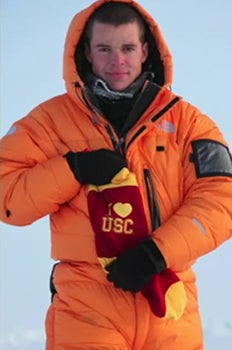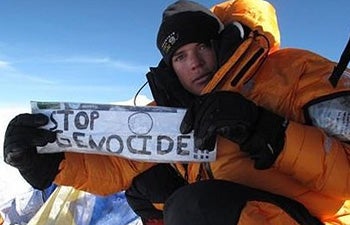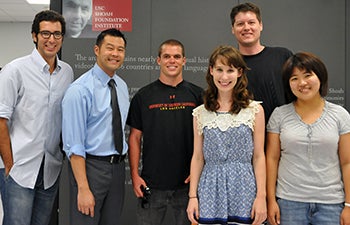High Priorities
Johnny Strange’s life is anything but ordinary.
At the tender age of 17, when most high school juniors are busy preparing for their SATs, Strange was embarking on a journey to climb the world’s highest mountain.
To scale Mount Everest, Strange’s climbing team made careful treks between established camps on the mountain face, acclimating to the thin air and waiting for the weather to allow safe passage to the peak. Hazards can include ice falls and avalanches. The journey took Strange and a team of 10 climbers, including his father Brian, two months to complete.
“You’re just towering over the planet. It’s a crazy, crazy feeling,” the USC Dornsife sophomore said of the hour he spent on the summit. “Mountains that are bigger than anything else look so small. Honestly, it’s the most beautiful sight in the world.”
Conquering Mount Everest was a major achievement in a larger goal for Strange: completing the Adventurer’s Grand Slam — reaching the highest summits on each of the seven continents and visiting the North and South Pole. The international relations major, now 20, achieved that feat, and was the youngest person to do so. His final hurdle was accomplished when he skydived into the North Pole, jumping at 8,000 feet from a helicopter, during his freshman year at USC.

USC Dornsife’s Johnny Strange shows his Trojan Family pride at the North Pole. Photo courtesy of Johnny Strange.
His parents Brian Strange and Dianette Wells, also adventurers, are his staunchest supporters. As children, Strange and his sisters Brianna, 22, and MacKenna, 15, would travel around the world to cheer their parents on as they competed in adventure races, making their way through rugged terrain by hiking, climbing, rappelling or kayaking.
With such intrepid roots, it’s not hard to see how Strange might have ended up on the summit of Mount Everest.
Strange, who grew up in Malibu, Calif., said when he was younger he had a wild streak. Mountain climbing, which requires endurance and discipline, was something he said his parents thought might calm him down.
“I think they thought it would humble me,” reflected Strange, who is amazingly grounded considering his many adventures. “The mountains have made me realize how small I am and how little I know. I definitely feel humbled.”
Strange, who also studies martial arts, can still be considered a “wild child” in many regards, though he’s set his sights on a larger purpose.
When he’s not studying he might be skydiving, paragliding, scuba diving, big wave surfing or climbing. During those ambitious outings, Strange is determined to raise awareness for causes close to his heart. He is known for flashing signs that read “Stop Genocide” and “Cure Parkinson’s” from the heights of his expeditions.

At the top of Mount Everest, Johnny Strange takes a moment to communicate a message for a cause close to his heart. Strange hopes to inspire those who follow his adventures to seek out more information about putting an end to genocide. Photo courtesy of Johnny Strange.
Strange hopes to inspire middle-school and high-school age youths who follow his adventures to seek out more information about genocide and Parkinson’s disease. With his escapades garnering attention from the media, he sees every photo he appears in as an opportunity for education.
“It might plant a seed,” Strange said. “A kid watching my skydiving video might say, that’s cool, but what does genocide mean? I’m going to do a Google search and find out more.”
A close friend’s father has Parkinson’s disease, and Strange hopes that putting the spotlight on finding a cure will raise awareness and encourage his fans to learn more about the disease.
As for genocide education, Strange was inspired to champion the cause during an expedition in Tanzania when he was 14. During a break climbing Mount Kilimanjaro, Strange joined a game of hacky sack with some of the porters.
One of the young men challenged him. He asked Strange if he would remember his new friends in Africa once he returned home to the U.S. Strange pledged then to never forget the people he met or the places he’s been.
“Being fortunate to travel the world, you get to see it from a different perspective,” Strange said. “I see the world as a smaller place. When genocide happens, like some of the current ones in Africa, for the people I meet there, that’s their backyard. Hearing their perspective makes me passionate. I’d be irresponsible if I didn’t try to raise awareness.”
Strange recently visited the USC Shoah Foundation – The Institute for Visual History and Education, housed in USC Dornsife, to learn about the institute’s resources and mission, which aligns closely with his interests.
The institute’s goal is to overcome prejudice, intolerance and bigotry through educational use of its visual history testimonies from survivors of the Holocaust and genocides in Rwanda and Armenia.

Recently, Johnny Strange (center) toured the USC Shoah Foundation – The Institute for Visual History and Education housed in USC Dornsife to learn more about the foundation’s mission, which aligns closely with his interests. Tour group, left to right: Riccardo Ruffolo, Leo Hsu, Johnny Strange, Emily Loynachan, A.J. Stein and Mingyi Wang. Photo by Michelle Salzman.
“I love the fact that USC Dornsife has the Shoah Foundation here. It’s a place that cares about the same things that I do,” Strange said. “Stories monumental in our history that might have been forgotten or swept under the rug are available to learn from.”
Strange plans to continue spreading his message of education in his forthcoming adventures. Next on his agenda is to swim the English Channel.
“I’m going to train hard, give it my best shot and see what happens.”